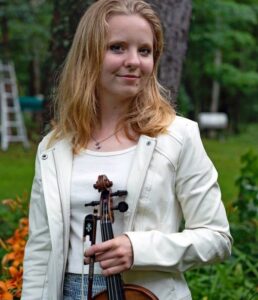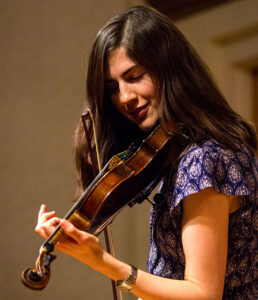Audrey Budington and Liz Faiella Feature, March 2023
Audrey Budington and Liz Faiella both claim to have “practically lived at the Music School” when they were younger. Before they assumed their current roles as leaders within the folk department, they each wandered the halls, fiddles in hand, buzzing from lessons to ensembles as long-time CCMS students. We were able to speak with Audrey and Liz about their experiences as students at CCMS, and their unique pathways that brought them back to be Music School faculty members:
Talk about how you first got into music. Who were your influences? Was your family musical?
Audrey: My mom said when I was about two, we were listening to the NH classical radio station and there was a beautiful violin concerto playing and I was like ‘that’s the instrument I’m going to play!’ Two years later the interest hadn’t gone away, so my mom figured we should give it a shot. So they rented a violin for me and I started playing. I grew up around a lot of Joni Mitchell, Simon and Garfunkel, and Crosby, Stills, Nash & Young, so I guess I’ve been really folky for a long time.
Liz: My parents love music, both classical and folk, but neither really do much in the way of playing. The main thing they did was help me and (my brother) Dan love music ourselves. They would also take us to lots of contra dances growing up with a homeschool group, as well as fiddle contests at Eagle Square in Concord which were really influential for me.
Was fiddle your first instrument? Did you ever try others?
Audrey: It was for a little bit, but eventually I wanted to take piano as well. I don’t like being competitive with the things I love, so when my piano teacher started suggesting I do competitions, I stopped. But it has remained my main composing instrument because you have everything at your disposal.
Liz: My parents started me on piano when I was five, but I was begging for a violin and I got one when I was eight. My parents were super interested in finding opportunities for (me and my brothers) to experience music of all sorts and gravitate towards whatever we connected with. I also really love singing and I would sing in the church choir growing up and eventually in a chorus at the Music School. I’ve found that the human voice is really close to the violin so it’s been really helpful for me to have that be a part of my life from the beginning.
Talk about your experience as a student at CCMS. Who did you study with? Were you involved with any ensembles?
Audrey: I studied classical violin with Bozena O’Brien from when I was four until I was almost through high school, and then with Rodger Ellsworth. I was in a lot of ensembles led by David Surette. When I was younger there were two folk ensembles; one with more traditional instruments and another with electric guitars, me on fiddle, and a kid on saxophone. I was also in a jazz ensemble led by David Tonkin. I pretty much just lived at the Music School.
Liz: I think I was 10 when I started taking both piano and violin lessons at CCMS. I don’t think there was a fiddle teacher at that time, so I was focusing mostly on classical music and classical violin. I started off with Judy Seaton who was this angelic person who was supportive of my fiddling and focused on helping me play what I loved but also building a strong foundation. She really set the tone for me of what the Music School was. I eventually moved over to Rodger Ellsworth and he really pushed me and challenged me, and I also joined an ensemble that he was leading which was great. It was around that time that I also encountered David Surette; I never took any lessons with him, but he welcomed me into playing at folk recitals with Dan and being able to explore that.
How did your time at CCMS influence your career/musical journey?
Audrey: I literally would not have done the things that I have done. I wouldn’t have gone to Berklee, and I wouldn’t have the courage to write music if it weren’t for people like David Surette. I think a lot of people pick up an instrument and play for a little while and then life gets in the way and they say ‘I always loved doing that’ but they never come back to it. If it weren’t for the Music School, I don’t know if I would have come back to it, and it would have been a gigantic regret.
Liz: CCMS left me with such a positive feeling towards music and I think that’s not a given. A lot of people I’ve worked with musically have talked about mildly traumatizing experiences they had with judgments involved or they were forced into doing something they didn’t really want to do. What the Music School did well for me was support my passions and what I was really interested in musically and a general sense of ‘we are helping you experience this joyful, beautiful thing.’
What have been some highlights of your music career to this point?
Audrey: The band Darlingside came to CCMS when I was a sophomore or junior in high school and the youth folk ensemble got to do a masterclass with them which was really fun. We also got to open for Black Violin because of CCMS and its connection with the Capitol Center for the Arts. And I also got to do a semester abroad at Berklee’s campus in Valencia, Spain and that shaped a lot of my personal growth and confidence.
Liz: Some of my favorite collaborations have been with people I’ve met through the Music School. It’s been an amazing opportunity that Dan and I have had to play together, and we connected with David Surette and did a lot of playing together. One of the greatest opportunities was at the Bank of NH Stage, they did this thing called ‘Celtic Night’ a few years ago which was a ton of fun. Jordan Tirrell-Wysocki and I would host together and would bring in a different guest artist every month. I would watch Jordan win fiddle contests growing up and now I was getting to play with him which was great. Also, the Maine Fiddle Camp or the Acadia Trad School where I’ve taught and played. You wind up staying up all hours of the night collaborating and playing tunes with people and connecting with musicians from all over New England.
Talk about joining the faculty at CCMS.
Audrey: When I was studying here as a kid I looked up to all these (faculty members) and wondered what it would be like to be one of these people. When I came back to be part of the faculty it was like coming home again. It has been tremendously rewarding to watch students of mine, and everybody else’s really, grow from beginners to confidently playing their first piece to being able to sight read and beyond.
Liz: I studied history in college and afterwards I was planning on going into journalism and I did a couple years where I was freelancing and exploring journalism as a career. I was continuing to play gigs with Dan from time to time and it occurred to me that I had an appreciation for journalism but a real love and passion for music. I called (former faculty member) Calvin Herst and David Surette and asked what it was like teaching music for a career and I got some really helpful advice from them and I asked if David needed a fiddle teacher over the summer. It was a slow start with just one or two students but eventually it really exploded, and it was a really wonderful thing and really felt like coming home.
What was your motivation for joining the CCMS faculty?
Audrey: I like having a role in helping people and watching them grow in confidence and ability and I knew this was a place where I could help make that happen because it did that for me. I came back from studying abroad right before the pandemic started. I had planned on returning to CCMS but didn’t know what that was going to look like. Somehow, I found out that they were looking for a daytime receptionist and I thought ‘this could be my in.’ From there I started with a couple students which has grown into 13 students and three classes.
Liz: This was a place that really nurtured my music life in a familial way, and there were so many people who were still there from when I was a student because people love the Music School and they stay. It was a new frontier for me to think of it as my career and having the support of all those colleagues was incredible. And the privilege of being with people on their musical and life journeys as a private lesson teacher, I don’t know where else you really get to experience that in quite this way.
What are some goals/hopes with your music in the coming months and years?
Audrey: I’m looking forward to my growth in my role as a faculty member here. I’m starting a beginning string chamber group in March and that should be fun teaching a group of children. I also have my album coming out in April and I’m looking forward to having my work out there as a ‘non-trad’ musician because its mostly pop and pop-punk.
Liz: One of my big goals at the Music School is to foster community. I’m trying to do this in the folk department especially and in the jam class which is for people who might be playing on their own to get empowered to play with others. Sometimes people need to experience that just to see what they would be missing if they only played their own solo stuff all the time. Helping people get that onramp into musical community is a big goal that I have.


